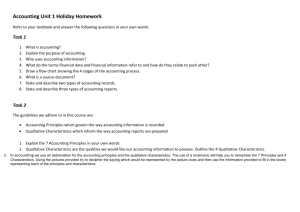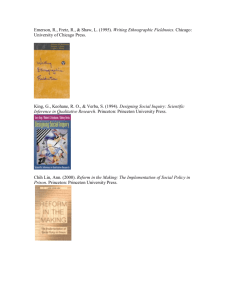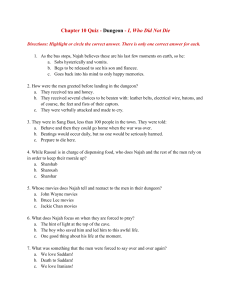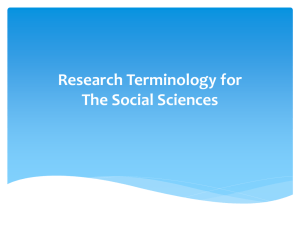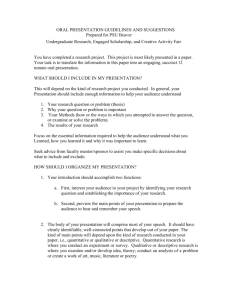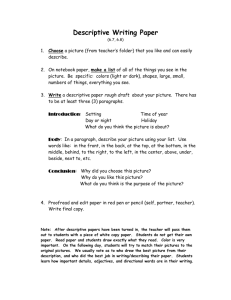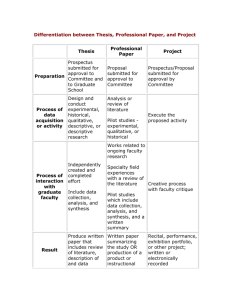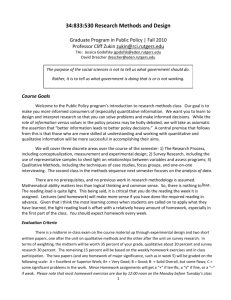1157ourse Syllabus Scientific Research - An
advertisement
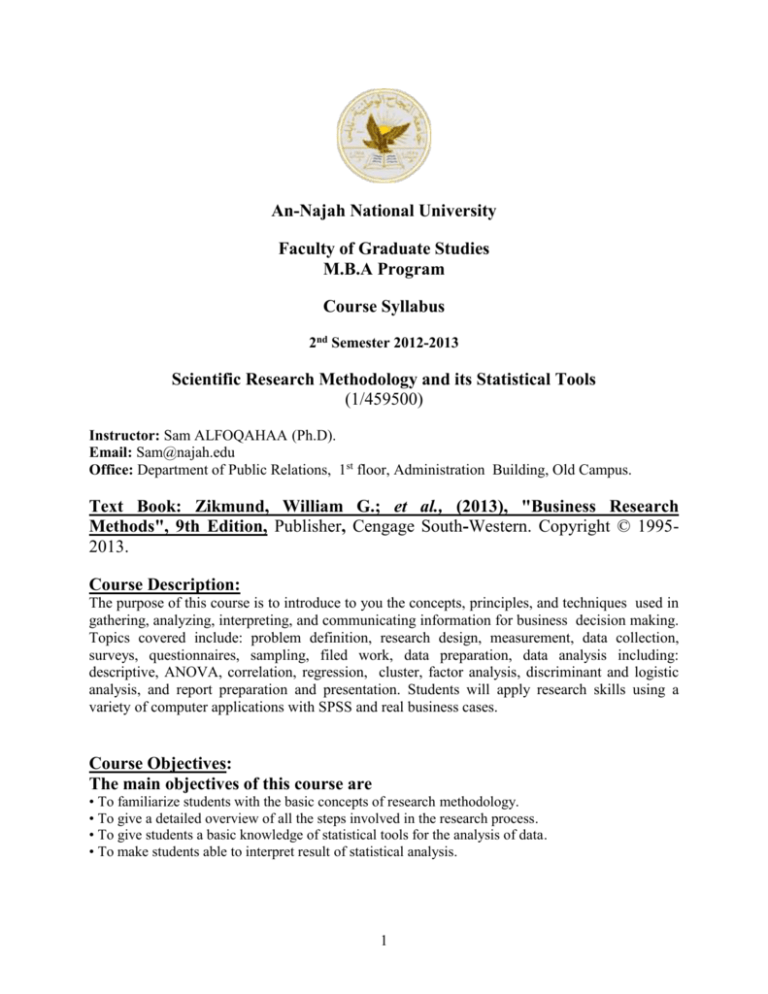
An-Najah National University Faculty of Graduate Studies M.B.A Program Course Syllabus 2nd Semester 2012-2013 Scientific Research Methodology and its Statistical Tools (1/459500) Instructor: Sam ALFOQAHAA (Ph.D). Email: Sam@najah.edu Office: Department of Public Relations, 1st floor, Administration Building, Old Campus. Text Book: Zikmund, William G.; et al., (2013), "Business Research Methods", 9th Edition, Publisher, Cengage South-Western. Copyright © 19952013. Course Description: The purpose of this course is to introduce to you the concepts, principles, and techniques used in gathering, analyzing, interpreting, and communicating information for business decision making. Topics covered include: problem definition, research design, measurement, data collection, surveys, questionnaires, sampling, filed work, data preparation, data analysis including: descriptive, ANOVA, correlation, regression, cluster, factor analysis, discriminant and logistic analysis, and report preparation and presentation. Students will apply research skills using a variety of computer applications with SPSS and real business cases. Course Objectives: The main objectives of this course are • To familiarize students with the basic concepts of research methodology. • To give a detailed overview of all the steps involved in the research process. • To give students a basic knowledge of statistical tools for the analysis of data. • To make students able to interpret result of statistical analysis. 1 By the end of this course, students should be able to: Understand the purpose of Commerce and Management research, the qualities of a good researcher, types of research, the research process and the characteristics of a good research project. Search relevant literature and develop appropriate research designs for their own research questions. Understand and apply a range of qualitative and quantitative approaches to data collection, data analysis and interpretation. Identify, evaluate and document relevant literature pertinent to research problems presented and discussed in class. write a research proposal based on skills acquired in the course. Determine real world business research problems, and develop a proper scientific research methodology to tackle them. Decide on the appropriateness and consistency between the different research components. Critically think about research work that have been already done by other researchers. Strongly adhere to ethical standards that are universally employed for conducting scientific research. Methods of Teaching and Learning: These will consist of textbook readings, real cases, active discussions, practice quizzes, First, Second and final examinations. Course Requirements Regular attendance is highly required. Classroom participation and presentation is highly recommended. Personal improvements, as long as we proceed, is needed. Assignment 1:Research Proposal: In this assignment, students develop and present a research proposal expressing their deep understanding of the research process. This work must be built on an intensive literature review. Each student will be given approx. 5 minutes to present his work. Each Student must hand a written research proposal three weeks before final exams. Assignment 2: Re-evaluation of previously published research papers. This assignment helps students to develop their analytical and critical thinking abilities thorough re-evaluating of previously published research papers. Students are expected to identify, evaluate and document their work which has to be done in a critical thinking manner. Each Student must hand an End-of-Semester Report on his work tow weeks before final exams. Computer applications with SPSS- Laboratory This training will practically familiarize students with the basic knowledge of statistical analysis of the research data. Training will include but not limited to- Data coding and entry, Descriptive statistics. Hypotheses testing, ANOVA and Post Hoc Tests (Multiple comparisons') Scheffe and LSD tests. Simple and Multiple regression,,,. Students are required to set for an Exam. 2 Grading: Mid-term Exam Classroom preparation and active discussion Assignments fulfillment and submission-Punctuality is appreciated and rewarded. (10% for assignment 1 & 5% for assignment 2) Computer applications with SPSS- Laboratory Final Exam Total 25% 5% 15% 5% 50% 100% COURSE OUTLINE Week Topic 1 Chapter 1: The Role of Business Research 2 Chapter 4: The Business Research Process: An overview 3 4 Chapter 6: Problem Definition: The foundation of business research Chapter 7: Qualitative research tools 5 Chapter 8: Secondary Data Research in a Digital Age 6 Chapter 12: Experimental Research 7 8 Mid-term Exam Chapter 13: Measurement and Scaling Concepts 9 Chapter 14: Attitude Measurement 10 Chapter 15: Questionnaire Design 11 Chapter 16: Sample Designs and Sampling Procedures; Chapter 17: Determination of Sample Size: A review of Statistical Theory 12 Chapter 19: Editing and Coding: Transforming Raw Data into Information; Chapter 20: Basic Data Analysis: Descriptive Statistics 13 Chapter 21: Univariate Statistical Analysis; Chapter 24: Multivariate Analysis 14 Chapter 23: Bivariate Analysis: Measures of Associations; Chapter 25: Communicating Research Results: Report Generation, Oral Presentation, and Follow up 15 Project and Presentation 16 Final Exam Additional References 1. Uma Sekaran, Roger Bougie. (2010), Research Methods for Business: A Skill Building Approach, 5th Edition, Wiley and Sons. ISBN-10: 0470744790 2. Creswell, J. (2003). Research Design: Qualitative, Quantitative, and Mixed Methods Approaches. Thousand Oaks, California: Sage Publications. 3. Patton, M.Q. (2002). Qualitative research & evaluation methods (3rd edition). Thousand Oaks, California: Sage Publications. 4. Recommended Website Sources: http://scholar.najah.edu/journals/humanities 5. http://www.najah.edu/ar/online-databases 6. http://www.emeraldinsight.com/ 3


